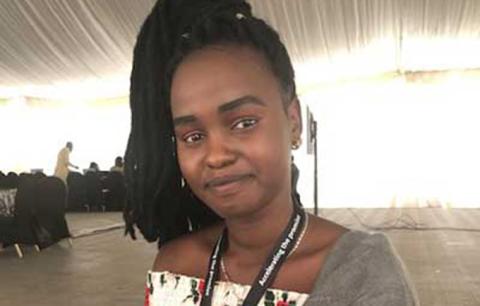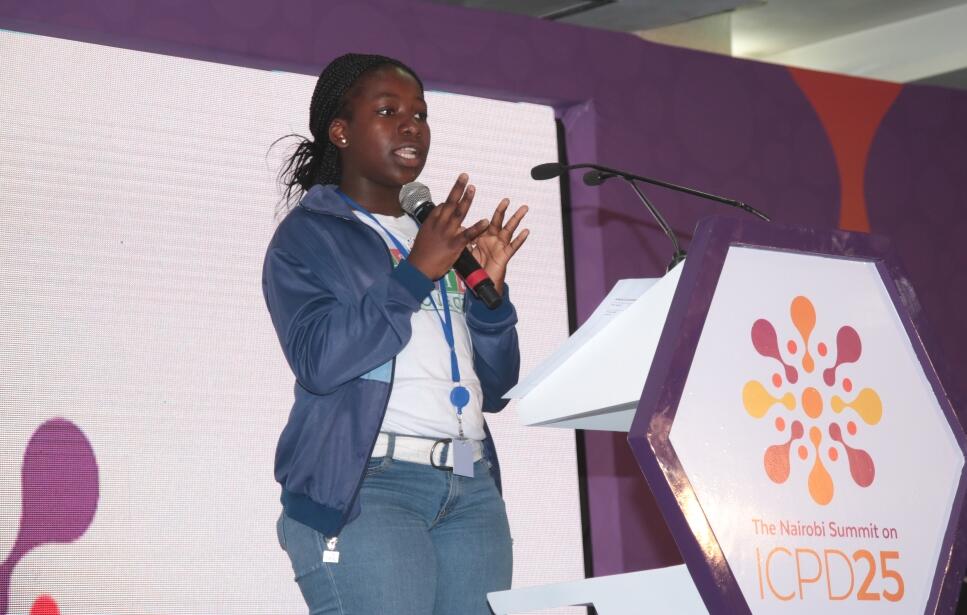The Nairobi Summit on ICPD25 was radically inclusive in that it featured speakers and participants from governments, civil society, youth groups, faith-based organizations, academia and many more. Among them were sexual and reproductive health and rights (SRHR) activists and champions, young and old, who affirmed their commitment to ensuring that no one is left behind.
Here we feature six powerful activists from the East and Southern Africa (ESA) region who are applying innovative strategies, and expressing optimism and urgency in securing rights for all, especially women, girls and young people. They are helping to push UNFPA’s transformative agenda of ending unmet need for family planning, ending preventable maternal death, ending gender-based violence and, in the ESA region, ending sexual transmission of HIV.
Crown Princess Mary of Denmark

Nairobi Summit. © Nairobi Summit
For Crown Princess Mary of Denmark, the International Conference on Population and Development (ICPD) is the "cornerstone of the sexual and reproductive rights movement". Protecting sexual and reproductive health and rights, women's empowerment and gender equality are all essential if we are to have any chance of achieving the ambitious Sustainable Development Goals by 2030, she believes.
A long-time advocate for sexual and reproductive health and rights, she represented Denmark at the 2012 High-Level Task Force on ICPD, prior to her key role at the Nairobi Summit, co-convened by the governments of Kenya and Denmark with UNFPA, the United Nations sexual and reproductive health agency.
Jocky Chatal Nkuruziza (Burundi)

Parliament, champions the ICPD agenda in Burundi. With her is
Richmond Tiemoko, Representative for UNFPA Burundi.
© UNFPA/Nancy Onyango
Jocky Chatal Nkurunziza is the 2nd Vice President in the Burundian Parliament. She was instrumental in championing for an ICPD review and debate in the Burundian Parliament and as a result of her advocacy, the government filed its commitment during the ICPD summit.
Despite a high rate of skilled attendance at birth (85 per cent), access to emergency obstetric care services is very limited in Burundi, with only seven health facilities offering basic and 23 offering comprehensive obstetric and newborn care services. In addition, the quality of available health care services is poor.
Burundi’s commitments:
- Increase the capacity of health workers to ensure full delivery of health services.
- Increase domestic resources to ensure that unmet need for family planning is reduced by a further 50 per cent (it is currently at 27 per cent).
- Improve the distribution of contraceptives and reduce stock-outs from 14 per cent to 5 per cent.
Priscilla Nyamal (South Sudan, living in Kenya)

Sudanese refugee in Kenya. Now she speaks out in support of other
girls at risk. © Nairobi Summit
“The reason why I am here at ICPD talking about my story is because I know there are some girls who are going through what I went through. I just want to be an example to them.” These were Priscilla Nyamal’s concluding remarks after she narrated her poignant story of how she ran away from home when her stepmother tried to marry her off to a 42-year-old man when she was just 14 years old, at Kakuma refugee camp.
Early marriage and early parenthood leaves many girls trapped, diminishes their opportunities to complete their education, and limits their future.
Now 19 years old, Priscilla is a champion for the global push to end child marriage. With the support of UNFPA in Kenya, she helps educate other girls about child marriage and its risks.
Yola Mgogwana (South Africa)

South Africa, was an inspirational young speaker at the summit.
© Nairobi Summit
“Three times this year, I have marched to Parliament with school children from all over the world to demand climate justice. Despite our hoarse voices and sore feet, I knew that our fight was not over,” said Yola Mgogwana, aged 12, from Khayelitsha, Cape Town.
Yola took to the stage with much gusto during the session on climate change adaptation and justice. She shared her powerful and inspiring story of what she is doing to mitigate climate change through the EarthChild Project Eco-Warriors Club. Her activism in the community includes activities such as monitoring water and electricity use, and reducing organic waste by starting up organic gardens in the community.
Trevor Oahile (Botswana)

representative at the summit. © Nairobi Summit
"Boys must learn about menstruation at the same age as girls and the girls must learn about boys' development as well. This will help reduce the stigma around menstrual health management. Menstruation is not a death sentence," said Trevor Oahile, who hosts the ‘Don’t Get it Twisted’ radio show on Yarona FM in Botswana. The show is sponsored by the UNFPA.
He spoke as a youth representative during the session on men and boys' rights to sexual and reproductive health.
His radio show explores why and how the sexual and reproductive health and rights needs and demands of men and boys can be addressed, and highlights the social norms that need to transform in order to enable this change.
“The community and society belive that if we teach young people in schools anything about sexual and reproductive health, we are encouraging them to have sex [while still] in school. We need to move away from that. I personally benefited through a peer education club that we had at school,” he said.
Senait Mehari (Eritrea)

Women, champions women's rights in her country.
© UNFPA/Nancy Onyango
“We are here because we recognize a lot remains to be done. We are here to share our best practices, to deliver commitments that will enable us realize Agenda 2030,” said Senait Mehari, Director-General of the National Union of Eritrean Women. She was part of the Eritrean delegation attending the summit.
Through concerted efforts by the Government of Eritrea and its many partners, the maternal mortality ratio has dropped dramatically in the country in recent years, in spite of a shortage of trained health workers, a low contraceptive prevalence rate, and the persistence of child marriage and female genital mutilation.
The National Union of Eritrean Women is dedicated to improving the status of Eritrean women by advocating for laws that protect women’s rights in the family, championing for equal access to education and employment, and advocating for an end to harmful traditional practices that endanger women’s health and well-being.
- Nancy Onyango


